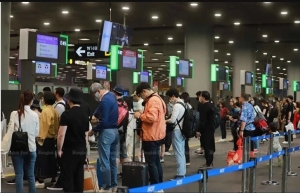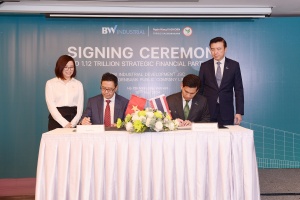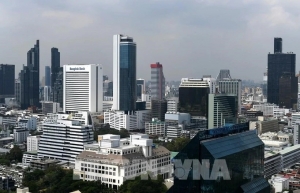Thailand intensifies AI policy to transform economy
 |
| Thailand intensifies AI policy to transform economy (Photo: bangkokpost.com) |
Bangkok - Thailand’s Ministry of Higher Education, Science, Research and Innovation (MHESI) is introducing its "MHESI for AI" policy, aiming to empower Thais to use artificial intelligence for national development.
MHESI Minister Supamas Isarabhakdi said the main obstacles for AI development in Thailand are a shortage of skilled workers and a lack of AI applications.
The ministry's policy integrates AI into university curricula, ensuring students and university personnel are literate about AI and able to use it effectively.
The policy adheres to ethical considerations about AI, she said.
The policy will be an engine to support universities transitioning to "Education 6.0" that integrates advanced tech in the learning process, preparing students for the challenges of the 21st century, according to the ministry.
The ministry wants to use AI technology to foster the economic and social development of the country, said Supamas.
The MHESI for AI policy has three main focus areas.
The first is AI for lifelong learning by developing AI teachers and coaches who will create platforms supporting lifelong learning for all stages of life. This initiative aims to provide the necessary skills, starting with English language proficiency for careers, creating a workforce to support the AI industries.
As Thailand has low English proficiency compared with other Southeast Asian countries, the ministry plans to enhance English learning efficiency through AI tools that support various teaching methods.
Moreover, AI will be utilised to simulate teachers or tutors for out-of-classroom learning based on individual interests, facilitating rapid skill development according to personal needs.
The second is AI workforce development by developing AI professionals and establishing AI infrastructure for Thai education and the labour market.
This includes programmes like promoting an understanding of AI at elementary, high school and vocational levels, developing international intellectual property innovations, and establishing an AI workforce for educational institutions. It also includes offering AI degree programmes and AI projects for public servants. The aim is to provide AI professionals, AI engineers, and IT professionals or other vocations with AI tool skills -- covering 30,000 people within three years.
The third is on AI innovation to drive the economy by providing the full support of AI innovation.
The ministry will expedite support for the practical application of AI innovation, especially in the business sector, through mechanisms such as innovation support from agencies within the ministry. It has a national AI development plan for 2022-2027, covering five strategies.
The first strategy focuses on creating understanding and awareness of ethical considerations. This strategy involves essential laws and regulations governing AI. The second is a focus on AI infrastructure development by increasing AI investment by 10 per cent annually. The third involves AI workforce development, aimed at producing 30,000 AI professionals. The fourth focuses on R&D in AI by creating 100 AI innovations that could impact the economy by 48 billion THB (1.3 billion USD). The fifth focuses on supporting AI business and AI usage in 600 organisations nationwide.
 | Thailand okeys 10-year EEC visa for foreigners Thailand’s cabinet has approved a special 10-year visa for executives and experts working in the Eastern Economic Corridor (EEC) to support the development of targeted industries in the country. |
 | Thailand's KBank offers $44 million loan to BW KBank, one of Thailand's leading banks, and BW Industrial Development Joint Stock Company, Vietnam's leading for-rent logistics and industrial platform, have announced a strategic financial partnership aimed at propelling the country's industrial and logistics sectors to new heights. |
 | Thailand steps up foreign investment attraction Thailand’s National Economic and Social Development Council (NESDC) has urged the government to facilitate the country’s transition to high-tech industries to attract investors as the second largest economy in the Southeast Asia is lagging behind others in the region in terms of growth rate and foreign direct investment (FDI) attraction. |
What the stars mean:
★ Poor ★ ★ Promising ★★★ Good ★★★★ Very good ★★★★★ Exceptional
Related Contents
Latest News
More News
- France supports Vietnam’s growing role in international arena: French Ambassador (January 25, 2026 | 10:11)
- Foreign leaders extend congratulations to Party General Secretary To Lam (January 25, 2026 | 10:01)
- Russian President congratulates Vietnamese Party leader during phone talks (January 25, 2026 | 09:58)
- Worldwide congratulations underscore confidence in Vietnam’s 14th Party Congress (January 23, 2026 | 09:02)
- Political parties, organisations, int’l friends send congratulations to 14th National Party Congress (January 22, 2026 | 09:33)
- 14th National Party Congress: Japanese media highlight Vietnam’s growth targets (January 21, 2026 | 09:46)
- 14th National Party Congress: Driving force for Vietnam to continue renewal, innovation, breakthroughs (January 21, 2026 | 09:42)
- Vietnam remains spiritual support for progressive forces: Colombian party leader (January 21, 2026 | 08:00)
- Int'l media provides large coverage of 14th National Party Congress's first working day (January 20, 2026 | 09:09)
- Vietnamese firms win top honours at ASEAN Digital Awards (January 16, 2026 | 16:45)

 Tag:
Tag:




















 Mobile Version
Mobile Version